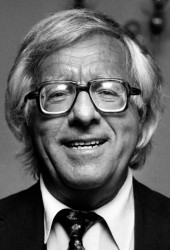No one has time any more for anyone else.
Ray Bradbury - Author's Quotes
Ray Douglas Bradbury (August 22, 1920 – June 5, 2012) was an American author and screenwriter.
He worked in a variety of genres, including fantasy, science fiction, horror, and mystery fiction.
Predominantly known for writing the iconic dystopian novel Fahrenheit 451 (1953), and his science-fiction and horror-story collections, The Martian Chronicles (1950), The Illustrated Man (1951), and I Sing the Body Electric (1969), Bradbury was one of the most celebrated 20th- and 21st-century American writers. While most of his best known work is in fantasy fiction, he also wrote in other genres, such as the coming-of-age novel Dandelion Wine (1957) and the fictionalized memoir Green Shadows, White Whale (1992).
Recipient of numerous awards, including a 2007 Pulitzer Citation, Bradbury also wrote and consulted on screenplays and television scripts, including Moby Dick and It Came from Outer Space. Many of his works were adapted to comic book, television, and film formats.
Upon his death in 2012, The New York Times called Bradbury "the writer most responsible for bringing modern science fiction into the literary mainstream".
Kindness and intelligence are the preoccupations of age. Being cruel and thoughtless is far more fascinating when you're twenty.
It was a quiet morning, the town covered over with darkness and at ease in bed.
Summer gathered in the weather, the wind had the proper touch, the breathing of the world was long and warm and slow. You had only to rise, lean from your window, and know that this indeed was the first real time of freedom and living, this was the first morning of summer.
Well, after all, this is the age of the disposable tissue.
Blow your nose on a person, wad them, flush them away, reach for another, blow, wad, flush.
Everyone using everyone else's coattails.
How are you supposed to root for the home team when you don't even have a programme or know the names?
For that matter, what colour jerseys are they wearing as they trot out on to the field?
But that's the wonderful thing about man; he never gets so discouraged or disgusted that he gives up doing it all over again, because he knows very well it is important and worth the doing.
When I was a boy my grandfather died, and he was a sculptor.
He was also a very kind man who had a lot of love to give the world, and he helped clean up the slum in our town; and he made toys for us and he did a million things in his lifetime; he was always busy with his hands.
And when he died, I suddenly realized I wasn't crying for him at all, but for the things he did.
I cried because he would never do them again, he would never carve another piece of wood or help us raise doves and pigeons in the back yard or play the violin the way he did, or tell us jokes the way he did.
He was part of us and when he died, all the actions stopped dead and there was no one to do them just the way he did.
He was individual.
He was an important man.
I've never gotten over his death.
Often I think, what wonderful carvings never came to birth because he died.
How many jokes are missing from the world, and how many homing pigeons untouched by his hands.
He shaped the world.
He did things to the world.
The world was bankrupted of ten million fine actions the night he passed on.
We have everything we need to be happy, but we aren't happy.
- quotations /
- book Quotes /
- Ray Bradbury — Quotes from Author's Books
